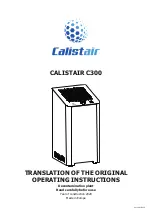
Access from the user program
KL6001
26
Version: 3.0.0
Parameterization with KS2000
The KS2000 configuration software can be used for parameterizations via the serial interface of the
Bus Coupler, independent of the fieldbus system.
5.2
Mapping in the Bus Coupler
As already described in the
Terminal Configuration
section, each Bus Terminal is mapped in the Bus
Coupler. This mapping is usually done with the default setting in the Bus Coupler / Bus Terminal. The
KS2000 configuration software or a master configuration software (e.g. ComProfibus or TwinCAT System
Manager) can be used to change this default setting.
If the terminals are fully evaluated, they occupy memory space in the input and output process image.
The following tables provide information about how the terminals map themselves in the Bus Coupler,
depending on the parameters set.
5.2.1
Standard format
In the standard format, the KL6001 is mapped by default with 4 bytes of input and output data (adjustable: 2
to 6 bytes via R35).
Note: In the standard format, the CT/ST byte is used for register and process data communication.
Conditions
I/O offset
High byte
Low byte
Complete evaluation: any
Motorola format: any
Word alignment: any
3
2
D4(opt.)
D3(opt.)
1
D2(opt.)
D1(opt.)
0
D0
CT/ST
Alternative format
In the alternatives format, the KL6001 is mapped with 4/6 bytes of input data and 4/6 bytes of output data.
The KL6001 is delivered in the alternative format.
Note: In the alternative format, the CT/ST byte is only used for register communication, while the Ser. CT/ST
byte is only used for the data handshake.
Default for: CANopen, CANCAL, DeviceNET, ControlNet, RS232 and RS485
Conditions
I/O offset
High byte
Low byte
Full evaluation: no
Motorola format: no
Word alignment: no
3
2
1
D2
D1
0
D0
Ser-CT/ST
Default for: PROFIBUS and Interbus
Conditions
I/O offset
High byte
Low byte
Full evaluation: no
Motorola format: yes
Word alignment: no
3
2
1
D1
D2
0
Ser-CT/ST
D0
Conditions
I/O offset
High byte
Low byte
Full evaluation: yes
Motorola format: no
Word alignment: no
3
2
D2
D1
1
-
D0
0
Ser-CT/ST
CT/ST
















































